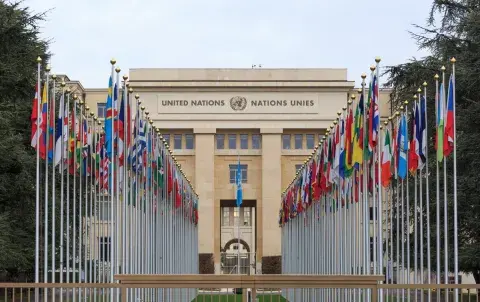
Jonas Haertle kindly agreed to an interview regarding his work at the United Nations Institute for Training and Research (UNITAR) based in Geneva, Switzerland. He shared his vision for collaboration with Franklin students and offered insight into how the MSIM program—where he teaches the course MGT 531 Global Issues and Responsible Leadership—and UNITAR prepare today’s students to be tomorrow’s leaders, equipped to address global challenges.
As a representative of UNITAR, what qualities or skills do you believe are crucial for future generations to possess to address global challenges effectively?
As a representative of UNITAR, we are the UN’s learning arm to promote sustainable development and capacity building. Future generations and students taking the MSIM courses must possess certain qualities and skills to address global challenges effectively. Through the 17 sustainable development goals (SDGs) and the Agenda 2030, the United Nations provides a comprehensive framework to guide efforts toward accomplishing these global goals. Qualities such as adaptability, critical thinking, and a global mindset are crucial for individuals, students, and future leaders to contribute meaningfully to the sustainable development challenges outlined in the SDGs.
How do you see the role of liberal arts education in preparing students to navigate complex global issues and foster a broader understanding of the world?
One of the reasons we wanted to partner with the students at a liberal arts institution like Franklin University Switzerland was to prepare its students to navigate complex global issues such as the challenges outlined by the sustainable development goals (SDGs). A liberal arts education fosters a broader understanding of the world and enables them to encounter a range of disciplines. The humanities are at the heart of social sciences, natural sciences, and arts. This interdisciplinary approach encourages students to think critically, have diverse perspectives, question assumptions, and seek more comprehensive solutions than if you look at it from one specific angle. Liberal Arts education is what future leaders and managers need as a bridge between different disciplines and brings us more holistic solutions.
From your perspective, what are the key benefits of interdisciplinary learning and collaboration for students in their pursuit of addressing global challenges?
By engaging in interdisciplinary collaboration and approaches, students are exposed to different perspectives and methodologies, leading to the ability to solve problems. It encourages them to go beyond traditional disciplinary boundaries. Students, our future leaders, will approach these problems with a holistic point of view. For example, today, many heat waves are happening around the world with real impacts on societies. This reality means that in developing countries, people cannot stay where they are. It puts pressure on national borders, especially those who travel across national borders. Climate change triggers change at a much smaller, local level than what may be obvious at first glance.
In your interactions with young leaders and students, what innovative and impactful approaches or mindsets emerged from integrating liberal arts education and addressing global issues?
There is a growing emphasis on social entrepreneurship, where students combine their knowledge and entrepreneurial mindset. I have seen that in the practical experience projects students in the Master of Science program in International Management have done, and students brought several excellent recommendations that have been taken into consideration by the UN entities who have worked with them. Beyond the FUS MSIM-UNITAR partnership, I’ve had the privilege of working on a business school initiative that connected 800 business schools globally on responsive management educational topics. It’s essential to challenge students with real-world problems related to the SDGs.
You must make your critical mindset come up with solutions. This is the kind of mindset that we want to foster. Go beyond disciplinary boundaries and be innovative. Social entrepreneurship is one example of how students and young learners can address some of today’s significant issues.

